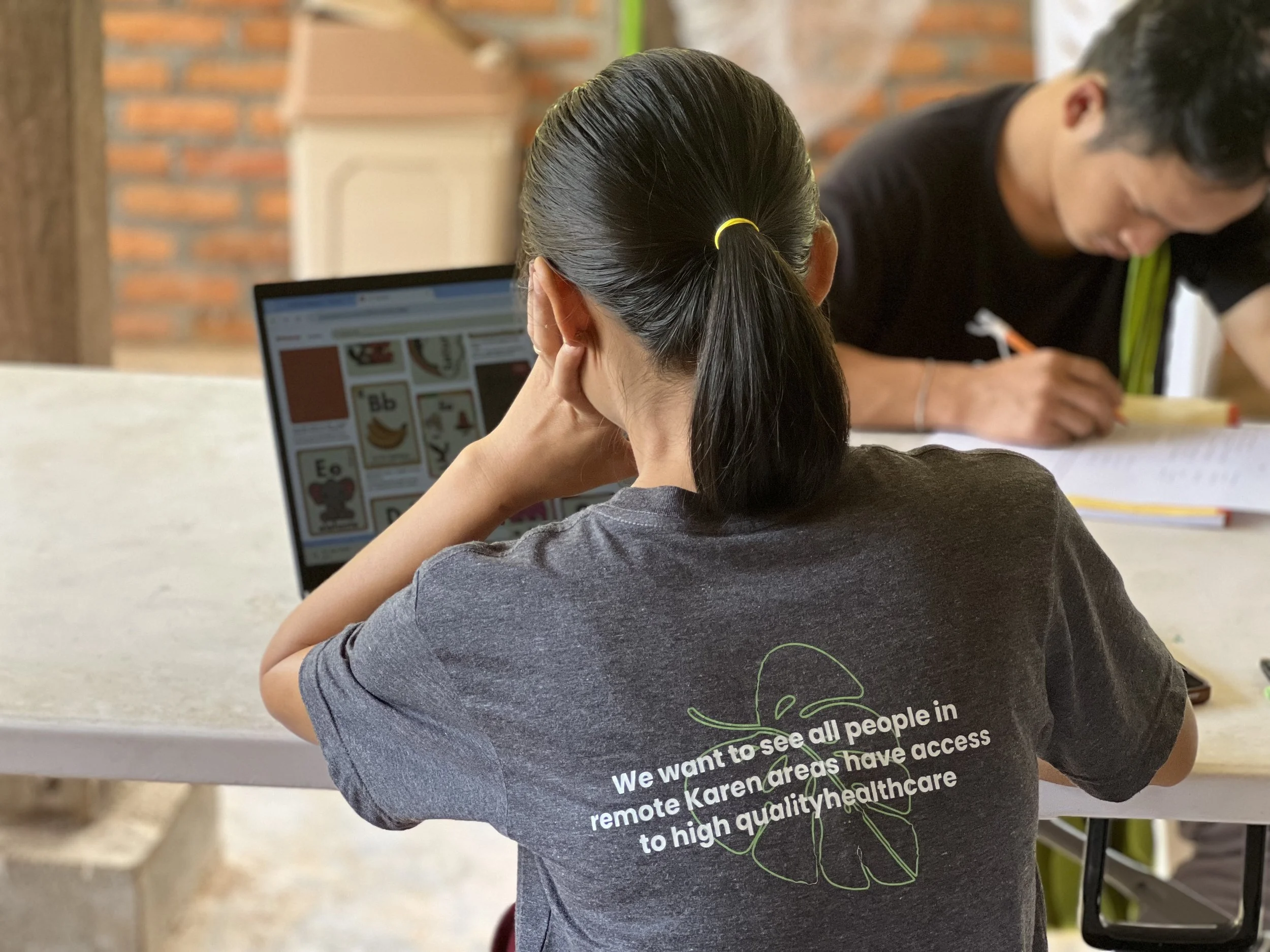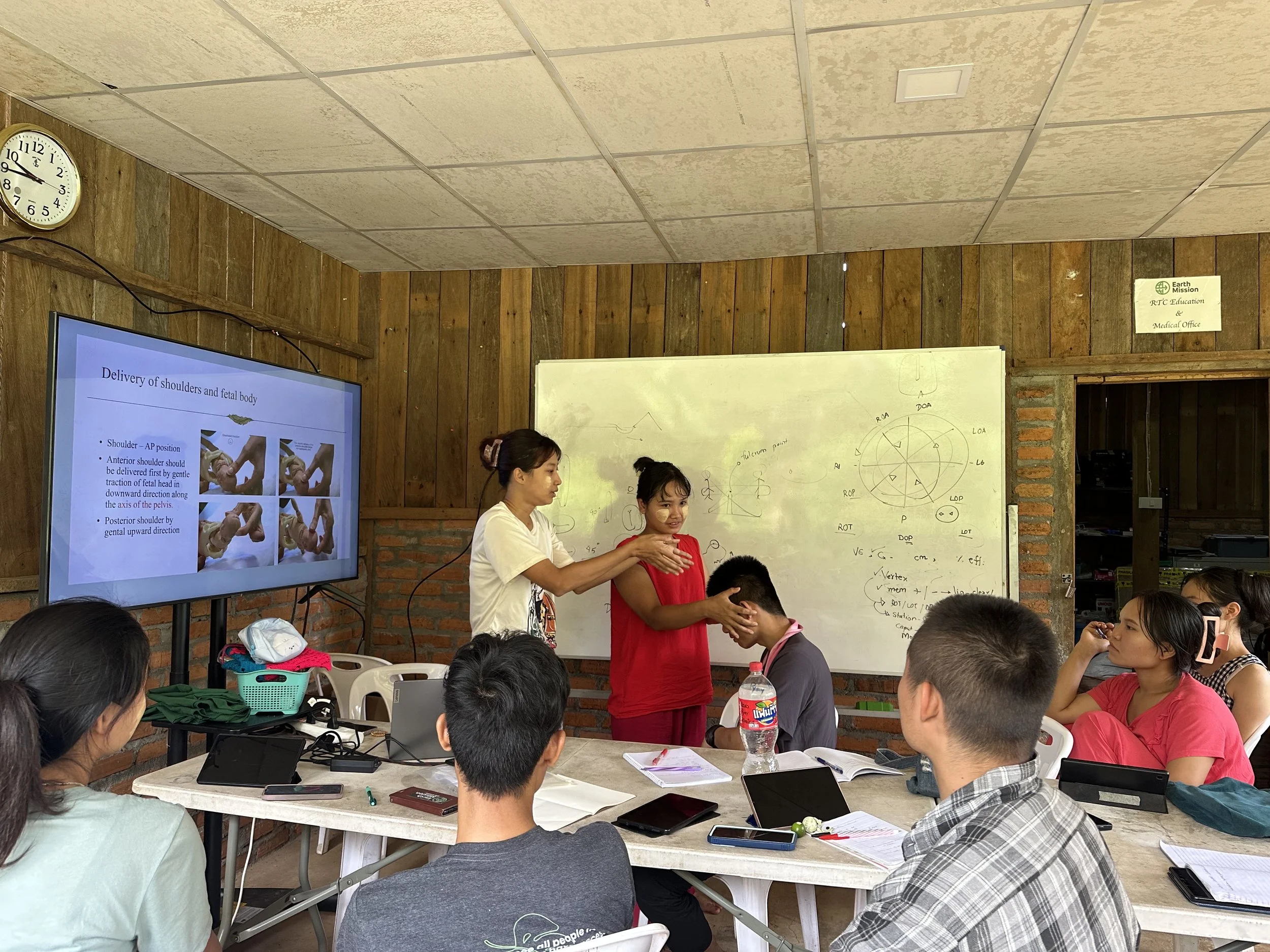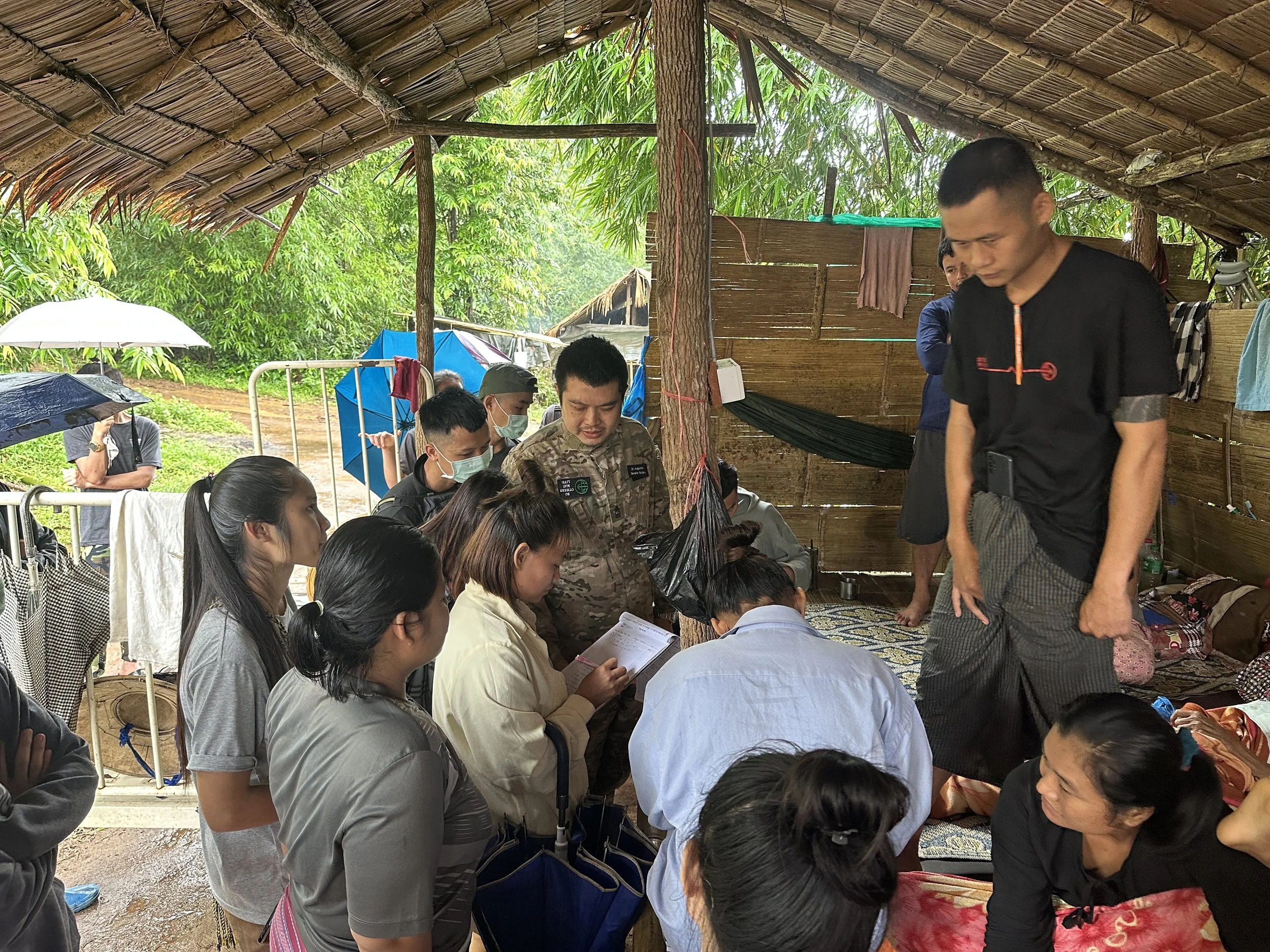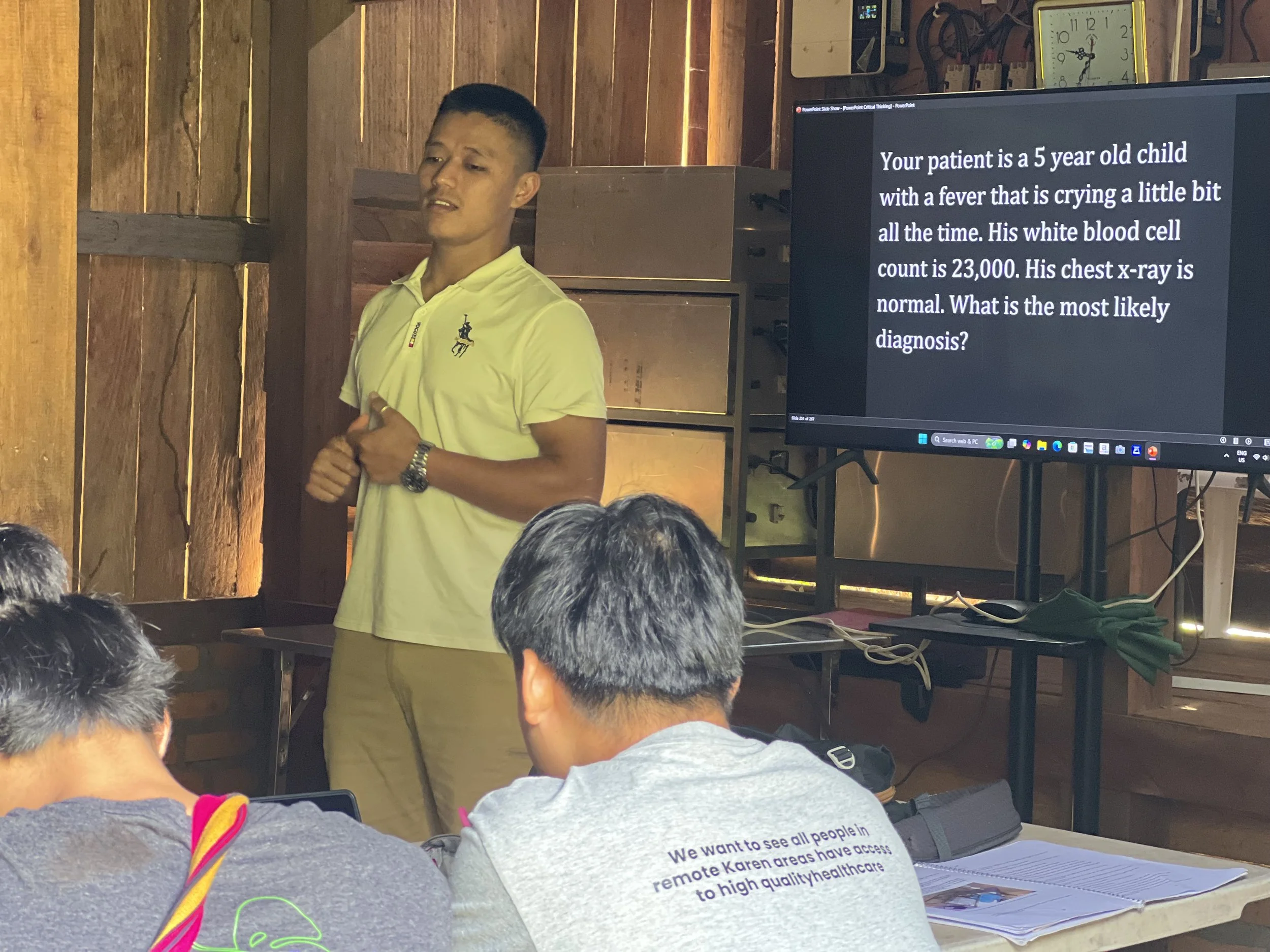Rethinking Learning: From Memorization to Metacognition
Bway, Communication Manager
“What has been your favorite thing about life at the Rain Tree Clinic so far?”
Naw Si Blu, Year 1 Physician Associate
“I have learned many things while living at RTC. I have learned from my teachers, seniors, and friends. I have also noticed that almost everyone here is friendly and generous. But my favorite part of life at RTC is learning new methods of study.
When I studied in Myanmar, most students, including myself, had to memorize everything taught by the teachers. Because of that, I struggled to teach children and did not feel like a good teacher. But here, I have learned a new way. Now, I try to ask questions, discuss with friends, and participate in everything. This has helped me grow and enjoy learning in a completely different way.”
Susan, Education Instructor
“Si Blu—You are such a brilliant young woman. I know you are going to do great things in Myanmar in the future. I am so glad that you are enjoying learning in a new way. I truly hope you will continue to practice this way of learning for the rest of your life and also use it to teach many young people in every village you live in after you leave RTC. I look forward to hearing about your accomplishments for the rest of my life.”
Bway, Communication Manager
I couldn’t agree more with Si Blu. I was also a student in Myanmar, and everything we learned had to be memorized. We were not allowed to ask questions. If we couldn’t memorize an essay or text—sometimes 4–5 pages long, sometimes even more—we were considered not brilliant. That’s why I always focused on memorizing everything taught in class. Believe it or not, I used to get first place in every exam just by memorizing, even down to where the commas, periods, and paragraph breaks were placed in the textbooks.
But here’s the truth: I didn’t remember most of it after the exam. It made me a “brilliant” student on paper, but not for life. Still, that system wasn’t entirely bad. In Myanmar, basic literacy was very strong. We practiced writing endlessly—learning every alphabet stroke by stroke. Until Grade 3 or 4, before heavy memorization began, we built a strong foundation in reading and writing. That foundation has stayed with me
Even so, I’ve always been a slow learner, especially in oral tests or when answering questions on the spot. To this day, I need to write things down to remember them. That’s the way I study: I write everything out, which takes a lot of time. I knew how to write, but I didn’t know how to pick out and summarize only the key points. That has often slowed me down.
Thankfully, my study skills have gradually improved in my ways of studying. I work as a communication staff member at Earth Mission. My role is hard to describe in just one word—it includes photography, creating content for annual, monthly, seasonal, and daily projects, writing stories, editing videos, encouraging people, and listening to them. After I prepare the content, the editing and polishing team makes it ready to publish.
Among these roles, writing medical stories is the most challenging. To truly understand what I write about, I have decided to join the Year 1 PA students in their anatomy and physiology class. That was the turning point—the moment when my study skills began to change.
Even though the memorizing study method is not always right and effective all the time for students for a lifetime, it works in some ways. We all agree on that. I worked hard, and I believed that I was blessed by God. Because He saw my eagerness to pursue higher education, He opened the way for me to attend university in Thailand, even though I started as a refugee student. I am so grateful for that.
However, in university, no one teaches you how to be a better learner or how to study. All they give you is the curriculum, assignments, and exams. I struggled through my four years of university life. Believe it or not, I was even among the first-honor students, but I didn’t remember much of what I had studied.
That’s why I am more than thankful to Mrs. Susan for introducing me to study methods based on metacognition when I joined to study with Year 1 PA students here at RTC. Metacognition means “thinking about your own thinking.” It’s the ability to be aware of how you learn, how you process information, and how you can adjust your strategies to learn better. Metacognition is like being the manager of your own brain—not just learning, but also watching how you learn and finding ways to improve.
Dr. Thiri guides Year 3 PA students in a hands-on delivery simulation.
Dr. Nant Htet and Year 2 PA students discuss infant diseases.
It has nothing to do with rote memorization. But to be honest, I struggled at the beginning of this class, because I was still stuck in my old ways of learning. What helped me was the way Mrs. Susan kept teaching and repeating the key points. She allowed students to ask and answer questions. I noticed that when I reviewed my notes during self-study, the information stuck—not just in my short-term memory, but deeper in my brain. This added to my real knowledge.
I would describe this as metacognitive knowledge—knowing what you know and what you don’t know. And I strongly believe that knowledge for a lifetime is more important than just getting good grades on exams. What I learn in this class, when I connect it with metacognitive strategies and keep reviewing, becomes knowledge that will stay with me. I may not remember everything, but I will remember the important parts for a lifetime if I keep using them.
One of my favorite statements from Mrs. Susan is: “If you don’t use it, you lose it.” She applies this to everything—from the brain, bones, and muscles to study tips.
Now, I no longer come to class worrying about what I don’t understand. I love learning new things, and during self-study, I take time to review what I understand and what I don’t. Then I return to class ready with questions.
PA students observe and ask questions during patient rounds with Dr. Augustine.
PA students practice diagnosing a theoretical patient case.
Ms. Susan works so hard to teach students in different ways so they can learn metacognitively. She doesn’t just teach information; she helps us realize what we don’t understand through questions, reviews, critical reading and writing assignments, quizzes, and feedback. I believe if PA students continue learning this way, they will not only do well on exams but also become excellent PAs in remote Karen areas.
What I have come to understand is that metacognition learning doesn’t only happen in class. It happens everywhere, every time, and lasts a lifetime.
That is what we really need for our students at Earth Mission—not just students with good grades, but smart, capable PAs and Engineers who keep learning and growing. Learning the right way, asking questions, and thinking about their own thinking.
Sponsor A Student
"Seeing people in remote areas suffering and sometimes even losing their lives from a lack of access to healthcare shows my heart that I am called to serve them.”
Thank you to all who have sponsored Ei Thazin! Now, she needs just 3 more sponsors, or $2,400, to support her final 2 years of medical education. Thank you for equipping Ei Thazin to bring hope and healing to her people.









